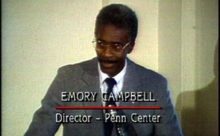The Beginning
by Tim Carrier, the Filmmaker
The sun's bright light poured into the aged oak-paneled room. Overhead, the ceiling fans beat it into a flickering shine that spilled on the crowd of faces straining to see the large black man in the dark suit who was addressing them.
"Mi broda ɛn mi sista dɛm, mi ɛn ol mi pipul dɛm we kam to wuna, hapi tu much for de ya!"
To most folks in the hall, that is most black folks who grew up along the creeks and marshes of the South Carolina and Georgia Sea Islands, the words were eerily familiar and they nodded in recognition. "My brothers and sisters, me and my entire entourage here with you, are extremely happy to be here!"
With those words, centuries of darkness began to break over the occupants of the hall. A black man, a black president from Africa, Joseph Momoh of Sierra Leone, had spoken to the cautious audience in a familiar, old-timey cadence that folks there knew well. He was speaking Gullah, the peculiar lilting speech brought from a forgotten shore by the enslaved ancestors of the Sea Islanders. If you were Gullah, this was that talk grandma used to talk, the kind that you got teased for using in school, and what you still fall into around home, friends and family. But here was an important person from that mysterious Africa in effect saying, "I am so happy to be here and to find that you are still Africans just like me!"
After that cool October morning in Frissell Community House at the Penn Center on St. Helena Island, Gullah culture took an about-face. From then on, those folks who grew up hiding their Gullah speech, their odd customs and folkways from an unforgiving outside world would come out and brag to everyone that they understood him, this president.
I was there on that amazing morning in 1988, a white guy totally unfamiliar with Gullah and Sea Island culture. It was a morning that would take me and my friend Domino Boulware, an African American, on a two-year sojourn, and ultimately to "that mysterious Africa," a place that turned out to be more familiar than not. On that morning, with the light pouring through those 12-foot-tall windows, we knew this was the real thing—a "great story." It was a story where you could actually see distant history coming to light and fading shadows on individual souls. Before the sojourn was over, the light would burn eyes to tears and brighten faces into smiles. But that is always true with finding home and family across the sea.
Tim Carrier has been a producer/director with South Carolina ETV since 1987, and videographer Domino Boulware has been with the network since 1973. Their work on Family Across the Sea has won them and the program a host of awards, including a Silver Apple from the National Educational Film and Video Festival, a CINE Golden Eagle, and a Gold Award from the Houston International Film and Video Festival. In addition, the Smithsonian Institution paid Family Across the Sea one of its highest honors by including the documentary in its permanent collection.
